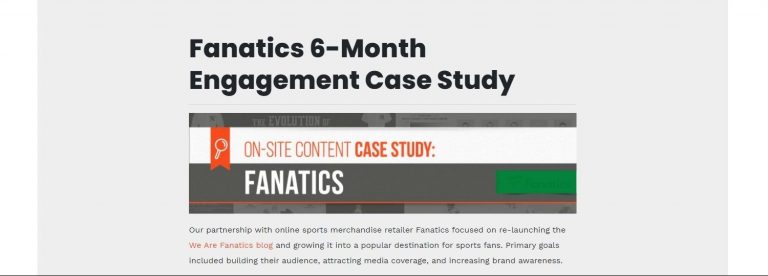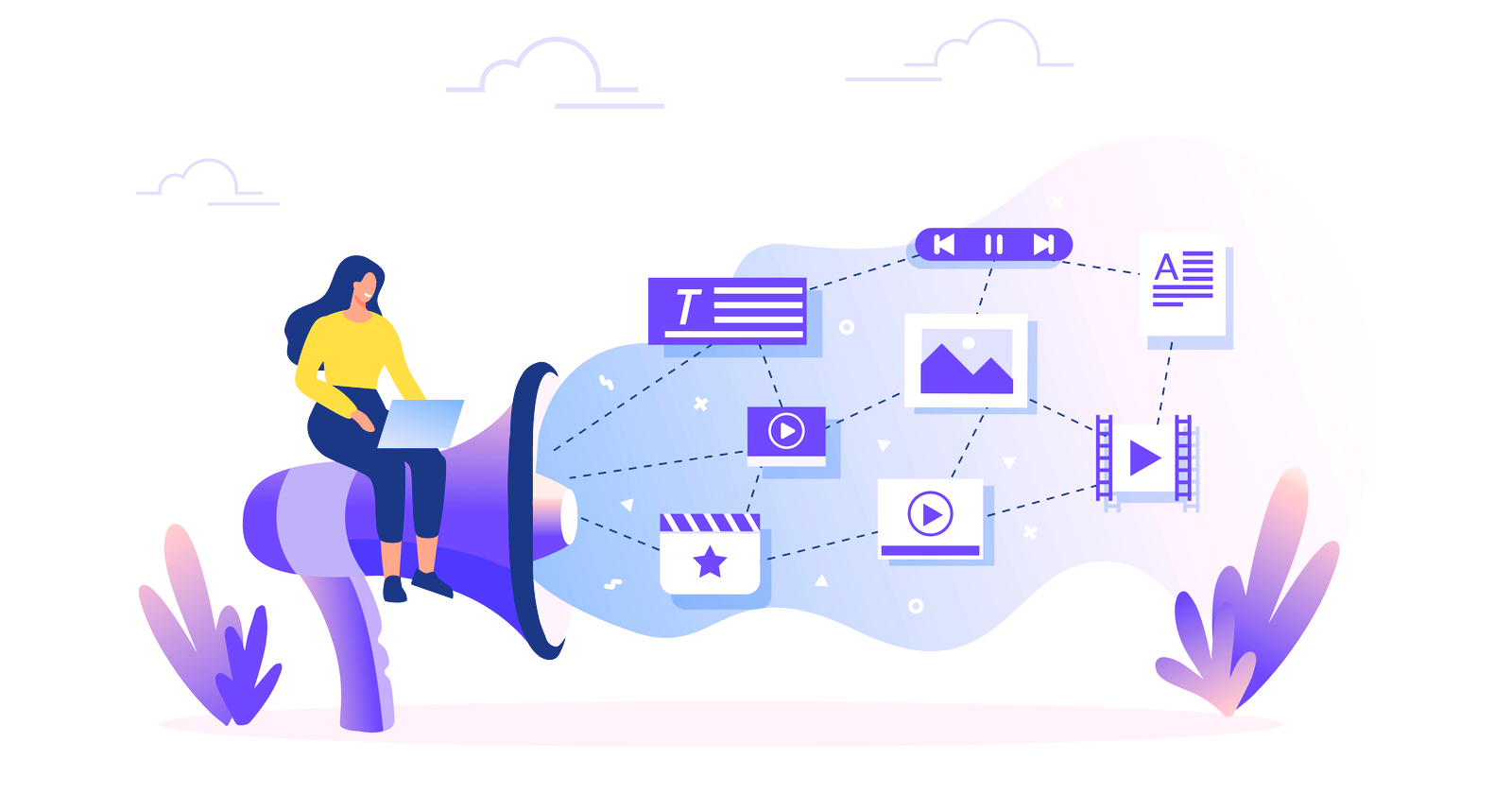Marketing is all about reaching your target audience at the right place and at the right time.
With more than 4.8 billion people using the internet today, internet marketing is one of the easiest and most affordable ways to reach your prospects.
Sounds like a no-brainer, right? There’s just one question.
What exactly is internet marketing?
In this column, you’ll learn how internet marketing is defined, how content marketing differs from traditional advertising, and why marketers are so excited about it.
You’ll also find examples of different types of content you can use to reach your internet marketing goals.
Ready? Let’s get to it!
Internet Marketing Explained
Internet marketing is the promotion of a company and its products or services through online tools that generate leads, drive traffic, and boost sales.
Also called online marketing or digital marketing, internet marketing relies on digital channels to distribute promotional messages.
Internet marketing is an umbrella term that covers a wide range of marketing strategies and avenues.
From emails, search engines, social media posts, and blog articles, there’s one common theme among all of these tactics: They all focus on delivering content.
With content marketing, gone are the days of hopeful sales pitches and traditional marketing.
Now, businesses can target their audience with pinpoint accuracy and provide useful information that resonates.
This is perfect because that’s exactly what today’s consumers want.
People don’t want to hear about products and services that don’t interest them.
From installing adblockers to clicking on “Skip Ads” buttons, today’s shoppers are more discerning about the information they’re willing to consume.
Content marketing delivers meaningful information that solves users’ problems and is accessible on consumer demand.
Content Marketing vs. Traditional Advertising
Can you believe there was a time when salesmen knocked on strangers’ doors to sell encyclopedias?
Today, we don’t even like it much when our friends knock on our doors unannounced.
The fact is, traditional marketing (or selling) doesn’t work anymore.
Its approach is to essentially push products and information onto people to pressure them into buying.
And frankly, people are over it.
You know it’s true because you yourself have been bombarded with radio ads, television, commercials, billboards, and even phone calls touting products that don’t interest you in the least.
While traditional ads may still work in some situations, the internet has changed the way consumers shop.
Now, armed with infinite amounts of information at their fingertips, users can take a more proactive approach to finding solutions to their problems.
They can search for the products that meet their needs — and avoid the ones that don’t.
We can all agree that ads are annoying. They interrupt our focus and take us away from our journey of finding content that is actually useful.
Not only that, they’re no longer the way people want to learn about new products.
Rather than intruding in consumers’ lives, brands and marketers need to take a different approach.
They should ask questions first and give answers second, rather than the other way around.
That’s where content marketing comes in.
Brands can research the specific needs of their target audience and create tailored content that inspires, educates, or alleviates a problem for their prospects.
Through a series of searches, people can find that online content on their own terms, rather than having it forced on them.
If the content provides value, they’ll keep returning for more.
With content marketing, the user is in the driver’s seat. They decide whether they want to engage with the brand and share the information with their social network.
This enables businesses to develop deep, meaningful relationships with their audience that are based on trust and authority.
When they decide they’re ready, those loyal followers can convert to leads – on their own terms.
This is what happens when you put the consumer’s needs above your own.
When you deliver content with the intention of providing valuable information, you’ll be rewarded with their business (and their loyalty) in the end.
Fundamentally, that is what internet marketing is all about.
But Why All the Hype Around Internet Marketing?
You understand what internet marketing is and how it’s beneficial for your brand.
But what’s with all the hype around it?
Internet marketing isn’t just a fad. It’s a proven winner.
Here are some reasons why brands and marketers are shouting it from the rooftops:
- By the end of 2021, the global content marketing industry is expected to reach $412 billion.
- Consumers who read a piece of brand content are 131% more likely to buy from that brand versus consumers who read no content.
- Fully 49% of B2B buyers said they are relying on content now more than ever to make purchase decisions.
If that wasn’t enough proof, I can tell you from personal experience that content marketing is highly effective.
I’ve seen my own small business grow in ways I never could have imagined, so we focus 99% of our efforts on content marketing.
5 Examples of Content That Provide Value for Big Returns
When it comes to content marketing, seeing is believing.
Check out these five examples of content you can use to deliver exceptional value to prospects and help you rank higher in search, too.
1. Blog Posts & Articles
When we think of content, we usually think first of blog posts.
That’s because they’re among the most common platforms for delivering useful content.
Blogs are terrific because they provide tons of ways to boost SEO.
They keep your website current and provide opportunities for audience engagement.
You can link to other authoritative sites, which helps boost customer loyalty and broadens your reach.
But you can also link back to your own pages, which keeps people on your website longer.
Most importantly, a blog can help you make a deeper connection with your audience.
All of this helps you generate more leads and add to sales growth.
2. Infographics
Infographics are a creative way to deliver complex information in a format that’s easy to understand.
Through charts, pictures, graphs, and illustrations, infographics break up the monotony of text by providing a fun, colorful visual for readers to digest (and share) valuable content.
They are eye-catching, simple to follow, and present some really valuable information in a way that’s easy for people to grasp.
Anyone who sees this kind of image can learn, at a glance, the important aspects of the topic being discussed.
3. Case Studies
Case studies are another impactful form of content marketing.
They’re an additional way for brands to provide authoritative content to inform and inspire their readers.
Case studies are basically in-depth documentation of an actual customer’s successful interaction with your brand.
They usually address the problem a consumer was having before they learned of your services. Then they explain how your products helped them achieve their goals.
Here’s a terrific example of a case study performed by Fractl:

The report highlights how the agency implemented a content marketing strategy to help a sports ecommerce website become a destination for sports lovers.
They explain why the campaign was necessary, what they did to help their client achieve their goals, and the measurable results of the project.
By providing concrete evidence of a brand’s effectiveness, case studies help build trust and earn business.
4. Podcasts
Not everyone has the time (or the desire) to conduct the in-depth research needed for blog articles and case studies.
Podcasts are a great alternative.
With 16 million Americans who identify as “avid podcast fans,” podcasts are an effective way to reach a large target audience.
They allow companies to use storytelling techniques to draw an audience in and share useful information.
Podcasts are also a way to add a level of personality to your marketing campaign.
Listeners get to know you as the voice of your brand, which helps to build more meaningful relationships with your followers.
You can also bring in guest speakers who add another level of authority while helping you expand your audience.
For a prime example of an effective podcast, tune in to The Search Engine Journal Show.
The official podcast of Search Engine Journal, this show discusses PPC, social media, SEO, content marketing, and digital marketing with industry leaders.
5. Videos
Video marketing has been a growing trend in recent years.
Now that brands seem to have a better grasp of how to use it effectively, 87% of brands who use it say they see an increase in ROI.
It’s not hard to understand why.
Videos are an entertaining way to consume information.
They’re convenient, don’t require a big investment of viewers’ time, and are easy to share with audiences.
Start Developing Your Content Marketing Strategy Today
The success of your internet marketing campaign hangs heavily on your ability to develop stellar content.
With so many mediums and platforms to choose from, you can certainly build a content strategy that will most effectively meet the needs of your target audience.
Set some goals, decide where you’ll host your content (website, YouTube, social media), and begin mapping out your plan.
Identify your target audience and research their keyword preferences.
Use this information to begin brainstorming topics for your content.
Start drafting material to share and promote on social channels.
The more you can do to establish and develop relationships with your audience, the more likely they’ll be to engage with your content.
Remember, internet marketing is all about reaching the right people at the right time with the right information for their needs.
This gentler approach to marketing is more appealing to your audience and can lead to endless possibilities for your business.
So roll up your sleeves, dig deep, and get to work.
Your online audience awaits!
More Resources:
- The Ultimate Guide to Digital Marketing
- The 5 Ws (& 1 H) of Content Marketing
- Content Experiences Are the New Content Marketing
- Content Marketing: The Ultimate Beginner’s Guide
Image Credits
All screenshots taken by the author, May 2021


